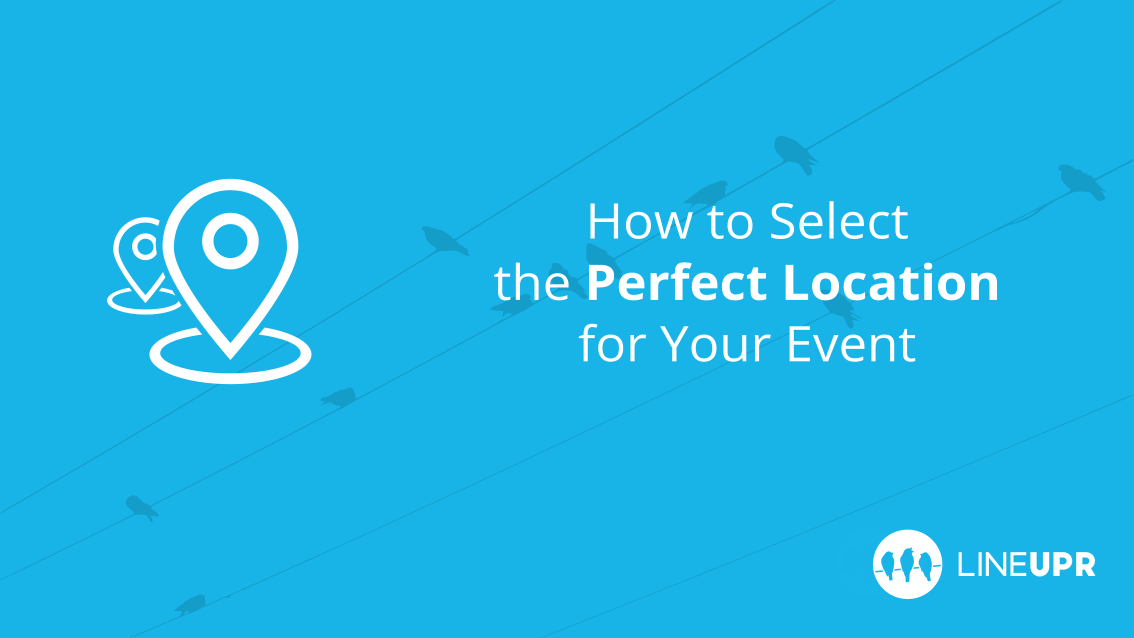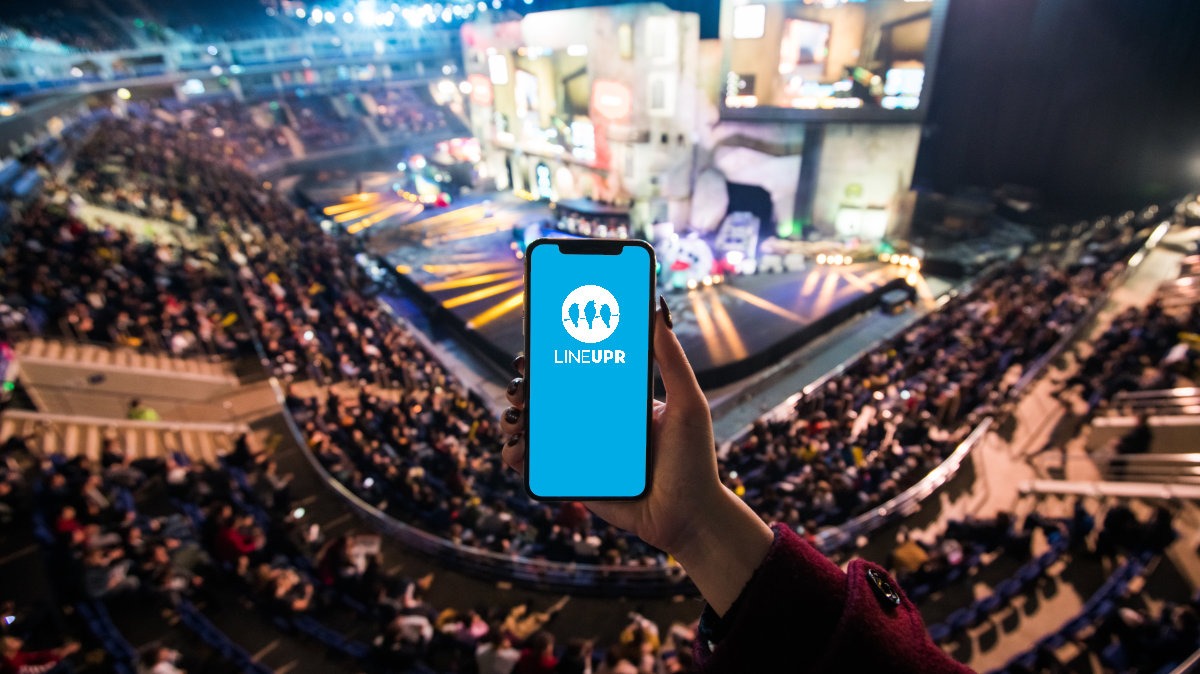Reading time: 6 minutes
How do I find the perfect location for my event? Our customers regularly deal with this question. After all, the place already says a lot about the event. You no longer have to worry too much about which of the countless venues suits you best, we have summarised the most important evaluation criteria for you.
However, to give you real added value, we didn’t do the analysis alone. We got advice and tips from a real locations expert. Ann-Kathrin Horstmann of Event Inc. communicates daily with both organizers and location owners. So she has a perfect picture of the needs of each side. Collectively we have put together 14 criteria for you to objectively compare different locations.
1. What Kind of Event Are You Organising?
Should it be a big conference or a small employee event? The type of event is crucial for the locations in question. It all depends on what you want to present.
Some prefer classic business venues such as seminar rooms in hotels or convention centers. Others are looking for extraordinary places, such as lofts, outdoor locations or old industrial halls.
For all your creativity, you should never forget the occasion of the event and check whether the location is suitable for it.
2. How Big Should the Event Location Be?
Depending on the type of event you can expect a larger or smaller amount of participants. With the location selection, you have to perform a balancing act – the location should not be too narrow and small, but also not too big, so that everything runs smoothly. Besides, you should consider psychological tricks. The same number of people appears as a larger group in a crowded room than in an empty room. And who wants to give the impression that nobody came to the event.
3. Which Participants Would You like to Address?
Like the type of event, the target group is also crucial for an optimal selection of the location. What other events do these participants attend? What do they expect as a standard? Creative venues such as industrial halls may be more negative for some participants, while others will perceive this environment very positively.
It is essential that you have a basic understanding of your participants. By doing so, you know what they prefer, how far you can experiment, and which places might be perceived as negative.
4. Where and When Should the Event Take Place?
This refers to the city/region as well as the date and time. Of course, the type of event and the participants also play a role. Where can you reach as many people as possible from your target group? Which date fits? Do other events, which address the same target group, take place simultaneously in the region?
5. Which Infrastructure Is Available?
Your participants must come to the venue. What options are available? How is the location connected to the public transport network? How many parking spaces are available?
Depending on what you plan for your event, items may also need to be delivered. How can this logistic be done efficiently? Which driveways can be used and which loading and unloading options are available?
Which connections are available for event technology and electricity? How are the lights and acoustics on site? Which sanitary facilities are available?
6. Which Event Technology Is Available?
Which event technology do you want to use? Is this technology already available locally and can be used free of charge or do you need to rent it? If not, then you have to bring this technology independently. You should also clarify whether this is possible and whether the corresponding connections are available locally.
You should not forget the Wi-fi. Your participants will be grateful.
7. Which Furniture Is Available?
Should your participants stand, sit on classic conference chairs or relax on a special seating, such as bean bags? Maybe you also want to offer individual areas such as smartphone charging stations or lounges for relaxation.
You should clarify in advance which furniture is already at the location and which can be rented additionally. Maybe you also want to use special furniture from external partners. In that case, you should find out if this is allowed.
8. What Should Your Catering Look Like?
Some venues dictate to their renters what kind of catering they can use as there is either an in-house catering company or fixed contracts with external partners. This often means a limitation of your ideas. You should clarify this in advance.
In general, however, you can also use external catering companies. But then you should find out whether the requirements of the caterer can be met. Are there enough cooling and storage facilities? Can your own devices such as refrigerators be brought and connected? Also, you should clarify whether enough space for a buffet or food stalls is available. Also, there should never be long queues for food.
9. Which Staff Is Available?
People are always the centerpiece of events. Therefore, the event staff is fundamental to the success of the event. Even the best food is worthless when bad-tempered employees distribute it.
Again, you should clarify in advance, if you must/can use the employees of the event location or if you can also bring external employees or your employees.
You have to clarify in advance for exactly which event areas you need employees and whether you prefer to rely on your employees or rely on employees from the location. Note that the latter are usually very knowledgeable about the area.
10. How Is the On-Site Security?
In the past, security at events was rather neglected. However, this has changed dramatically as of lately. Today, event security is more critical than ever. The health of the guests should always be in the foreground for you. In addition, no organizer wants to deal with a suit for damages.
So find out where the escape doors and routes, fire extinguishers, emergency lights and first aid kit are located. Of course, the first aid boxes and fire extinguishers should not be expired.
You should also pay attention to the observance of the legal safety regulations. Escape doors and routes must not, for example, be closed or adjusted and they must be marked.
11. Which Regulations Do You Have to Observe?
In addition to the safety regulations, as an organizer you must also observe other local and national laws. Locations must, for example, comply with the assembly place ordinance. This differs depending on the federal state and regulates the operation of locations. Besides, you should inform yourself about the house rules and clarify whether an event insurance makes sense. You should also inform yourself on the aspects of the permitted volume and existing smoking areas or smoking bans.
12. Keep in Mind Hidden Costs
In addition to the location rental, there are often additional costs that are hidden at first glance. Don’t let the landlord lead you onto thin ice. Ask in advance for other possible charges. The communicated prices of most locations often only include the pure room rent. Any use of additional services costs extra and this will be communicated only after the conclusion of the lease.
First, there are the typical additional costs such as electricity, heating, waste disposal and the final cleaning. Are costs incurred for the cooling and event technologies used? How much does the in-house catering cost? Is the existing furniture free? Are extra expenses incurred when using external partners? Is a security officer necessary? Who does this and what does it cost? If the landlord offers drinks, are there packages available here? What is included in these packages? Often, alcoholic drinks are not included. What do the drinks cost, after the package has been used up?
13. What Is Your Event Budget?
The first 12 criteria allow you to assign a value and rank to each of your locations. Your event budget now determines which location offers you the best service for the price and is thus your optimal location.
14. Listen to Your Gut Feeling!
When it comes to decisions, we rely too often on the bare numbers and forget to include our feelings. If your gut tells you that a particular location fits perfectly, then listen to it, even if this location is not the best choice according to the 13 criteria mentioned above.
Of course, you should not entirely forget all of the objective criteria, but your gut feeling can be a useful addition to your decision-making process.
What should you have learned
How do I find the perfect location for my event? This decision is not easy, because you have to consider many factors. We gave you 14 criteria to make this decision a little easier and to compare different locations objectively.
What is your opinion on the 14 criteria? How do you choose your event location? We look forward to your feedback.
“Map Marker” Icon created by Rohith M S from “the Noun Project“.



